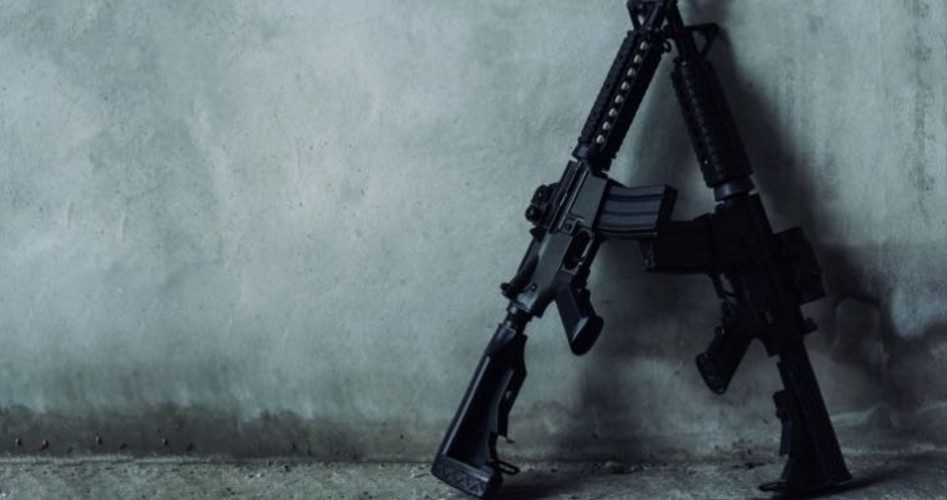
John Randolph, an early 19th-century congressman from Virginia and a cousin to Thomas Jefferson, once remarked that the Constitution of the United States is really “just parchment” — just words on a piece of paper — unless we are prepared to make sure government officials follow those words. Now, our rights are endangered by a popular vote in Washington State.
Fifty-nine percent of Washington voters approved an initiative in November to increase the age limit to buy semi-automatic assault-style rifles to 21, strengthening background checks for anyone buying an “assault rifle,” and requiring all guns to be safely stored (stored weapons aren’t generally useful for self-defense, and safes cost money, putting a burden on the poor).
The provision raising the age to buy certain types of rifles to 21 went into effect with the New Year on Tuesday, while the other two requirements will become law on July 1.
Not surprisingly, the gun-control lobby was ecstatic. “We’ve seen that assault rifles are the weapon of choice for mass shootings, and when they’re used, more people are killed and injured,” claimed Kristen Ellingboe of the Washington Alliance for Gun Responsibility. “We’ve seen time and again that Washington voters want action to prevent gun violence in our state.”
Some other states that have also taken away the rights of adults between the ages of 18 and 21 to purchase certain firearms include Florida, California, Hawaii, Illinois, Vermont, and New York.
A federal lawsuit has already been filed against the proposal, arguing the measure violates the Second Amendment to the Constitution, as well as the rights of gun merchants under the Constitution’s commerce clause. Plaintiffs include some adults under age 21, the Second Amendment Foundation, and the National Rifle Association. Some firearms dealers in Washington State have also joined the suit.
Dave Workman, speaking for the Second Amendment Foundation, explained the rationale for the suit: “Starting today, young adults between the ages of 18 to 20 will have their rights to purchase semi-automatic rifles stripped away.”
When California recently passed a similar infringement on gun rights of adults under 21, Craig DeLuz of the Firearms Policy Coalition was equally indignant. “Governor Brown just told millions of people under 21 that they can fight and die for our state and country with machine guns, but they can’t buy a gun for self-defense in their homes. That’s nuts.”
But in Washington State, a strong majority of voters have said just that. Bob Ferguson, the attorney general of Washington, said in an e-mail that he “looks forward to representing the people of the state of Washington in court against the NRA. The gun lobby is trying to thwart the will of nearly 60 percent of Washingtonian voters who supported common sense gun reform in our state.”
If one were to substitute another of the rights protected in the Bill of Rights, such as speech, instead of saying Washington voters had supported “common sense” reform, so-called common sense could be called “infringement,” and it would be easily understood as such. Can one imagine the outcry were a state to pass a law that said one could not exercise free speech or vote until the age of 21? Some would most likely respond in outrage, arguing that the 26th Amendment lowered the national voting age to 18. But the Second Amendment, like the First Amendment, does not provide protection of the right to keep and bear arms only to those who have attained the age of 21.
In fact, a closer examination of the Second Amendment reveals just how blatantly unconstitutional is the action that Washington State has taken. “A well-regulated militia, being necessary to the security of a free state, the right of the people to keep and bear arms shall not be infringed,” reads the text. Supporters of an individual’s right to keep and bear arms quite understandably focus on the “shall not be infringed” portion of the text; however, in this instance, we need to give some attention to the “militia” portion of the Second Amendment.
George Mason said that the militia “is our ultimate safety. We can have no security without it.” Just who is included in the militia? Mason explained, “They consist now of the whole people, except for a few public officers.”
Mason was not alone in his view. The Second Congress defined “the militia” as every citizen who was at least 18 years of age.
Additionally, do we really want to put the Bill of Rights or any of the rights that we have enjoyed in America up to a popular vote? Should we end free speech, religious liberty, the right of property, due process of law, or, in this case, the right to keep and bear arms, simply because 59 percent of the people who happened to vote in an election do not believe in liberty?
If the voters in Washington State can take away constitutionally protected rights of adults who are 20 years of age, what principle stops them from infringing on the rights of a 22-year-old to exercise free speech?


